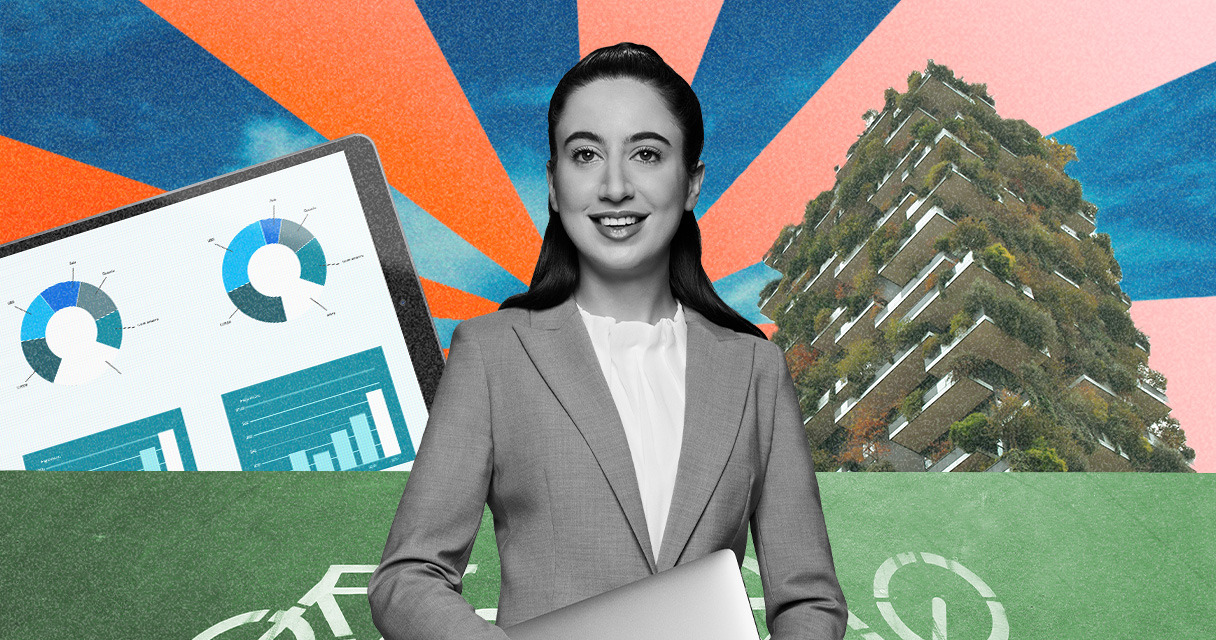CHAMPION
INVESTMENT ANALYST
Is maths your thing, but you don’t want to dive into tax returns? Investment analysts are critical to growing the clean economy.

At first glance, the link between investment analysis and the transition to a net zero emissions economy might not be immediately obvious.
But for Shadah Orfinejad, the intersect between the environment and economics is not only clear, it’s a fascinating place to develop a career.
Shadah works for Squadron Energy, a company that develops, operates and owns renewable energy assets in Australia, delivering renewable generation and ‘firming assets’ such as batteries that keep the grid working.
“At a high level, my role is to assist in understanding decisions made within a business, and being able to illustrate the impact those decisions have,” Shadah says. “On a micro level, it’s looking across the asset base of a company and thinking about decisions you need to make, and how to fund those decisions.”
With a commerce degree majoring in economics and natural resource management, Shadah had an early focus on environmental policy, but her career has not followed a straight line.
“Honestly, I had no real idea what I wanted to do,” she says. “I was the first in my family to attend university. I had no idea what was out there in the professional sphere.”
While at uni, Shadah sought out mentorship opportunities and volunteered for the Heart Foundation, Oxfam and the youth-run development organisation Oaktree, to get an understanding of the non-profit space in Australia.
As she neared the end of her course, Shadah began applying for a wide range of graduate roles, from government departments, to banks, to resource companies.
“The first time I dipped my toes in the corporate sector was as a graduate Commercial Analyst at Woodside Energy, which is a huge organisation. I rotated across different areas of the business as part of the grad program, then I stumbled upon a position at Squadron. I’d just finished a rotation in the carbon and new energy team, and realised it was work I enjoyed.”
“I was also slightly apprehensive of making the move, due to the uncertainty of working at a much smaller fish – Squadron – as opposed to a mammoth organisation. Squadron was relatively small at the time. That bore a lot of uncertainty, but I was excited to go from one in 6,000 to one in 50… once I’d interviewed with and met my current manager, I knew I was headed in the right direction.”
For Shadah, changing jobs also meant changing cities, and a move from Perth to Sydney, and away from her family.
“I think my family are immensely proud – they understand the importance of the transition away from fossil fuels, but although they’d like me to be closer, they’re very supportive.
“They started with very little,” Shadah continues. “My dad came to Australia in the late 1980s fleeing persecution in Iran and found work as a bus driver, and my mum didn’t exceed year 10. She worked in administration, then when I was in school she decided to go to TAFE, and now works as a teacher’s aide. Thinking back to everything they had to overcome, I’m immensely proud of them, too.”
For anyone hoping to move into a clean economy career, and more specifically the renewables sector, Shadah says there’s plenty of opportunity.
“There are a lot of roles for people who already have some experience, but as with any industry, for people beginning their careers it’s more challenging,” she says. “If you’re someone in your penultimate year of uni and without many industry-relevant skills, I would recommend starting your career with a large, established organisation which affords you a lot of training, so you can then move into roles like this. It’s worth looking at any large corporate or resources company – the skills are still transferable, but it gives you a feel for the nature of the work directly.”
And as for the work, Shadah has a few tips about the specific skills to focus on. “Try and get comfortable in Excel. I started my career with no knowledge, which was definitely a hurdle I had to overcome. Embrace group assignments – learning how to communicate effectively and coordinate tasks amongst different groups is such a valuable skill. You don’t need to know everything, you just need to know how to ask others for help and how to delegate,” she says.
“I started my career with literally no relevant experience, so my best advice is to apply for anything and everything that interests you. If you can, try and intern while you’re at uni, which will prepare you for graduate roles. Even if you doubt your skillset, just apply for things. Don’t pull out before the race has even started,” Shadah says. “You can learn anything with repetition, you just need to be receptive of feedback. It’s not about getting everything right 100 per cent of the time, it’s about having the right attitude.”
Shadah Orfinejad is an Investment Analyst at Squadron Energy. She holds a Bachelor of Commerce